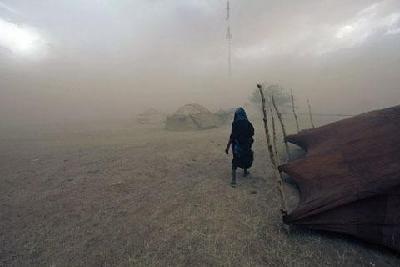分享到

Scientists say the effects of climate change could actually make breathing more difficult for many people. They expect rising temperatures to bring an increase in cases of asthma and allergies, as well as infectious and cardiovascular diseases.
Professor Kent Pinkerton said rising temperatures bring a host of conditions that can adversely affect people's health. For example, ozone levels may rise in urban areas. There may be more wildfires emitting smoke and soot. Desertification could increase and create more dust. There may also be a lot more pollen. And disease carrying insects and animals may be more prevalent.
"Our greatest concern really centered around the fact that many of the pulmonary physicians and respiratory professionals are really not very well aware of the fact that climate change has an important impact on their patients," he said.
A lot worse than a runny nose
Pinkerton, co-author of the study, has some bad news for allergy sufferers about pollen.
"Those who suffer from allergies may actually be finding that that season that impacts on their health and on their allergies is becoming longer," he said.
However, he says the effects can be much worse than coughing, sneezing, watery eyes or a runny nose.
"Those are the symptoms that people most note. But we're also seeing that individuals who may already have a pre-existing respiratory condition or even a cardiovascular condition are also being affected by these. Some of these conditions might simply be an exacerbation of an asthmatic condition. Or some issues where particles are actually producing cardiovascular complications in the form of arrhythmias among individuals or irregular heartbeat. Or changes that may actually lead to stroke or myocardial infarction," he said.
Myocardial infarction is commonly known as a heart attack.
Pinkerton is a professor of pediatrics at the University of California Davis School of Medicine. He calls on the World Health Organization, governments and others to approve public health measures to protect vulnerable populations. These include infants, children and the elderly.
Illnesses on the move
"We're now beginning to see some infections and some vector borne diseases in different areas of the world that we've never seen before. For example, diseases that have commonly been found within the Mediterranean are now being seen as far north as the Scandinavian countries. We've also seen some issues about mold that typically was only found within Mexico and Central America that are now as far north as British Columbia in Canada," he said.
The study on climate change and health was written by a ten member committee, including members from Africa, Europe, Asia, India, the Middle East and the United States. It appears in the Proceedings of the American Thoracic Society.
pulmonary: of, relating to, or affecting the lungs 肺的
arrhythmias: an irregularity in the force or rhythm of the heartbeat 心律失常
myocardial infarction: 心肌梗塞
How changes on the sun can affect our climate
Link between air pollution and heart disease
Miserable allergies? Blame global warming
(來源:VOA 編輯:旭燕)
分享到
關注和訂閱


電話:8610-84883645
傳真:8610-84883500
Email: languagetips@chinadaily.com.cn